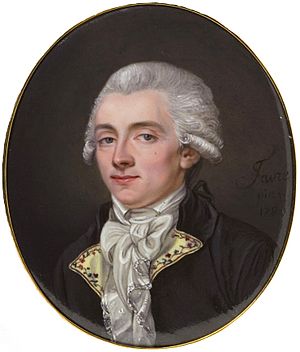Jean Joseph Mounier facts for kids
Jean Joseph Mounier (born November 12, 1758 – died January 28, 1806) was an important French politician and judge. He played a key role during the early days of the French Revolution, trying to create a new government that balanced the power of the king with the rights of the people.
Early Life and Career
Jean Joseph Mounier was born in Grenoble, a city in southeastern France. His father was a cloth merchant. Jean Joseph studied law and, in 1782, he bought a small judgeship in Grenoble. This was a common way to get a position in the legal system back then.
In 1788, Mounier became involved in a big disagreement between the local courts (called parlements) and the king's government. He helped organize a meeting of representatives from the Dauphiné region in Vizille on July 20, 1788. This meeting happened just before the start of the French Revolution. Mounier was the secretary of this meeting. He also helped write the cahiers (which means "notebooks"). These notebooks listed the complaints and requests that the people of Dauphiné wanted to present to King Louis XVI.
Role in the French Revolution
Because of his work in Dauphiné, Mounier became well-known. In 1789, he was chosen to represent the Third Estate (the common people) at the Estates General. This was a big meeting called by the king to discuss France's problems. Mounier also started a political group called the Monarchiens in August 1789. This group wanted a government similar to Britain's, with a king who shared power with a strong parliament.
At the Estates General, and later in the Constituent Assembly, Mounier supported many new ideas. He believed that the three different groups (the clergy, the nobles, and the common people) should work together. He famously suggested the Tennis Court Oath, where members of the Third Estate promised not to stop meeting until they had written a new constitution for France. He also helped prepare parts of the new constitution and asked for the return of Jacques Necker, a popular minister who had been fired by the king.
After the Estates General became the National Assembly, Mounier was chosen for the committee that would write the constitution. He was a main author of the first three articles of the Declaration of the Rights of Man and of the Citizen. This important document was adopted on August 6, 1789. Even though he helped write it, Mounier thought that a declaration of rights should always be part of a complete written constitution. On September 28, 1789, he was elected president of the Constituent Assembly.
However, Mounier did not agree with some of the events that followed, especially the growing violence and radical changes. He left Paris and went back to Dauphiné. He then resigned from his position as a deputy. Because he was seen as a suspect by the new, more extreme leaders, he had to seek safety in Switzerland in 1790.
Later Life and Legacy
Jean Joseph Mounier returned to France in 1801. By this time, Napoleon Bonaparte was in power. Napoleon appointed Mounier as the prefect (a high-ranking official) of the department of Ille-et-Vilaine. Mounier did a great job reorganizing this area. In 1805, he was made a councillor of state, which was another important government position. He passed away in Paris in 1806.
Mounier wrote several important books about government and the French Revolution. These include Considérations sur les gouvernements (1789) and Recherches sur les causes qui ont empeché les Français de devenir libres (1792).
See also
 In Spanish: Jean-Joseph Mounier para niños
In Spanish: Jean-Joseph Mounier para niños
 | Emma Amos |
 | Edward Mitchell Bannister |
 | Larry D. Alexander |
 | Ernie Barnes |


